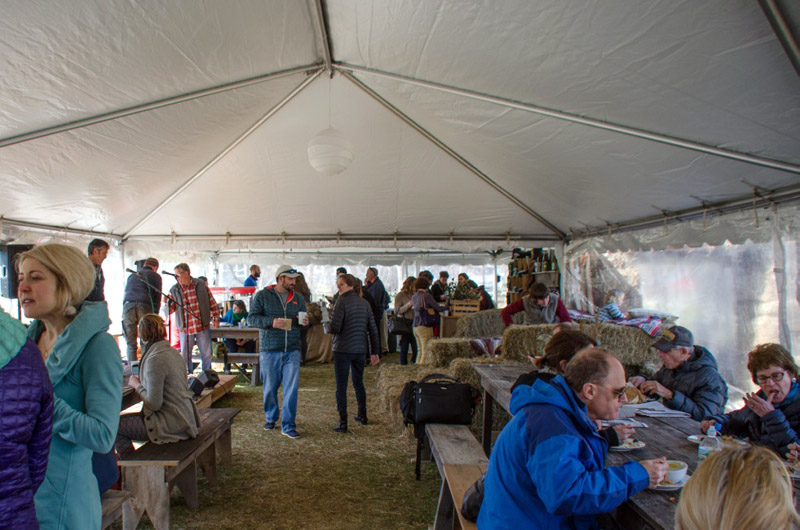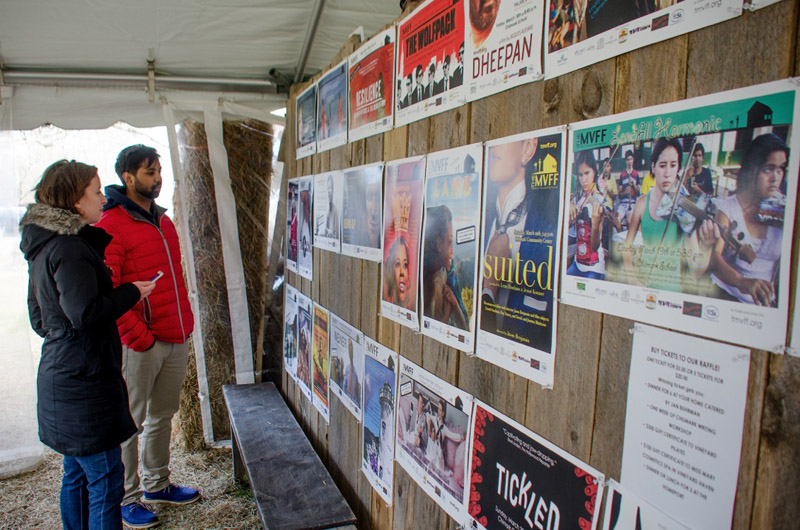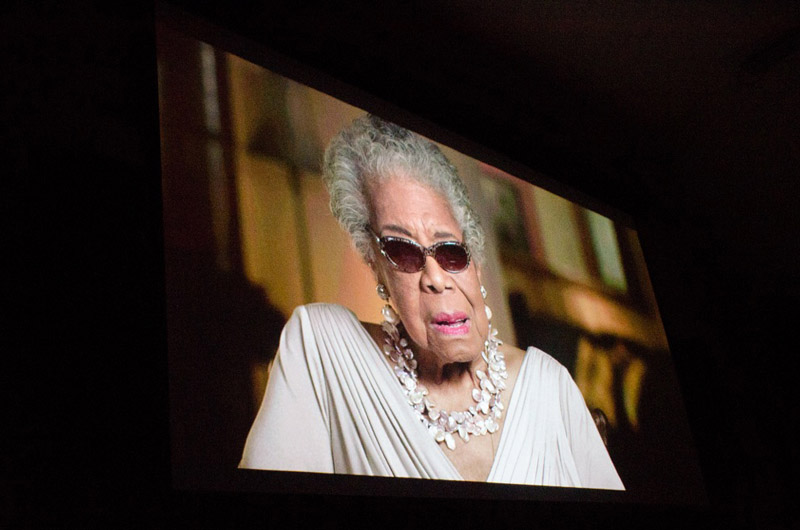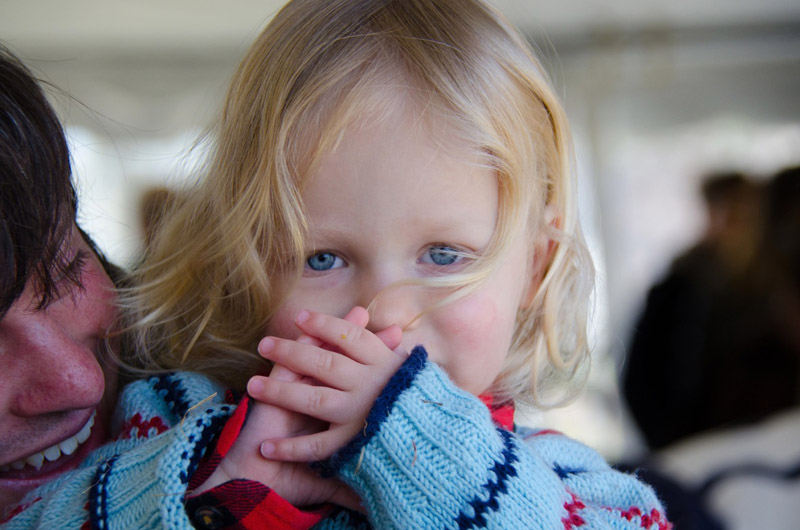Standing in line for a 3:45 p.m. showing of Presenting Princess Shaw at the 16th annual Martha’s Vineyard Film Festival on Saturday, a man turned to another asking if this was his first film of the day.
“This is our — one, two, three, fourth today,” he said. “We’re doing it so thoroughly we might be overdoing it.”
He was not alone, as the main issue for film buffs during the four day festival was how to choose among so many films, especially when screen times for two films overlapped — or not ordering tickets soon enough.
“I wanted to see Lamb, but it was sold out,” a woman in the audience told a girl sitting next to her. “But I’m excited to see this too.”
Following the showing of Presenting Princess Shaw, the subject appeared on stage to discuss the documentary. In real life, Princess Shaw works at a nursing home in New Orleans, L.A. She is also a singer who went from obscurity to internet renown after a popular Israeli composer found some of her clips on YouTube and created a back track for one of her songs.
“I just don’t think Martha’s Vineyard is real,” Princess Shaw said to the crowd. “A place like this can’t be real. I think you all are lying.”
When asked by an adoring audience if she will appear in more films, Princess Shaw responded with an immediate no.
“That documentary is enough for me. I look at it and I’m like no, that’s the wrong angle, look at my hair,” she said.
The film followed Princess Shaw’s daily life, from open mic nights to going to work in the morning, and also dipped into darker moments. She read a passage from her work-in-progress book that recalled physical and sexual abuse as a child, and when speaking with the audience she teared up remembering a suicide attempt when she was 18.
The festival featured another documentary about a female musician, Sonita, about a young Afghani rap singer living in Iran, where young women are not allowed to sing, and girls are often sold into marriage at a young age. In the film, Sonita is seen keeping a notebook in which she tapes magazine pictures to illustrate her imagined future, and says her dream parents would be Rihanna and Michael Jackson.
When Sonita learns she will be able to attend a music school in America, she begins practicing English with filmmaker Rokhsareh Ghaem Maghami.
Ms. Maghami skyped in to speak with the audience at the end of the film.
In a break with documentary tradition, Ms. Maghami directly involved herself in Sonita’s life, even paying $2,000 to keep her from being taken back to Afghanistan and married off to a stranger. Though this level of involvement in a film was unprecedented for her, she has always been a part of her films, she told the Vineyard audience.
“I won’t deny my existence,” she said.
In the most pivotal question of the Q&A, a woman asked if because of this film Ms. Maghami has reconsidered the boundary between subject and filmmaker for future films.
“Now I think, yes, you should break that boundary,” Ms. Maghami said. “This is something I want to play with more.”
In between films, festival attendees relaxed in the hay cafe where they listened to music and enjoyed plates of farm fresh food prepared by Robert Lionette from Morning Glory Farm. The smell of fresh popcorn wafted through the tent and a buzz of conversation harmonized with the strums of guitars.
Throughout the weekend, festival founder Thomas Bena escorted film subjects to the Chilmark location in his blue pick-up truck. The six Angulo brothers who make up The Wolf Pack piled in, four in front and two in the back cab. The documentary looks at the lives of the brothers who from a young age were sequestered away in a New York apartment by their reclusive father. The Wolf Pack was the only film shown three times over the weekend.
After popping into the Hay Cafe to grab some muffins, the brothers clambered back into the truck to head to the beach. Standing in the back with a sweatshirt hood pulled tightly around his face, one brother assured a concerned on-looker, “danger is my middle name,” before they hit the road.
In a white couch near the front of the make-shift theatre in the Chilmark Community Center, director Jason Benjamin and film subjects Daniel Friedman, Rae Tutera, and Derek and Joanna Matteson settled in to watch Suited. It was Mr. Tutera and Mr. Friedman’s second time seeing the film and Mr. and Mrs. Matteson’s third.
“The first time was really difficult, I was nervous,” Mr. Matteson told the audience. ”Because none of us knew what footage would be in the film.”
Mr. Tutera and Mr. Friedman are the co-founders of Bindle and Keep, a bespoke tailor shop in New York city whose clientele includes many people in the LGBTQA+ community. Mr. Matteson, a trans man, came to them for a suit for his wedding. He agreed to be in the film primarily to show how a trans person from a small town had the unwavering support of his family, a narrative not always seen in media.
“I wanted to show non-college people in a rural town supporting their kid 100 per cent,” he said. Mr. and Mrs. Matteson’s wedding was a highlight in the documentary and they are now expecting twins.

Mr. Friedman said Bindle and Keep is not novel because it caters to people of different shapes and sizes. In fact that is what all tailors do.
“All we do that is actually novel is we listen to our clients and say, how do you want to feel?” he said. “We don’t assume anything.”
As the day turned to evening, people gathered outside around a small bonfire to discuss the many films they had already seen and were planning to see. Film makers and film subjects also wandered about talking in more intimate circles with their new fans, including Princess Shaw who enjoyed a meal while seated at a community table inside the lit tent, proving yet again that the festival is not only real, it is essential.










Comments
Comment policy »